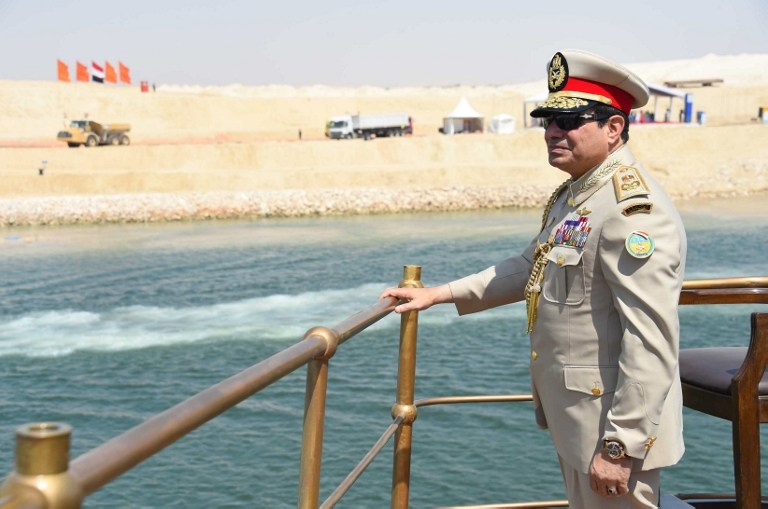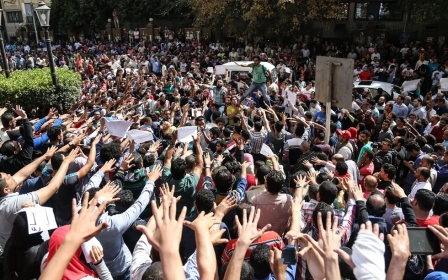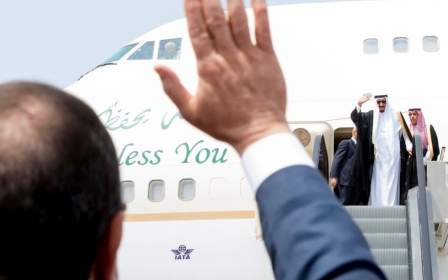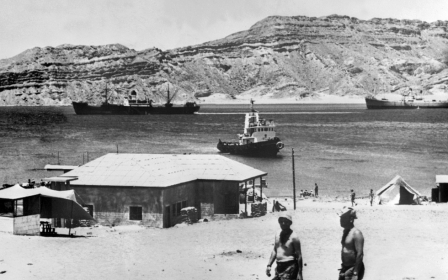Of turtles and dictators: Is this the beginning of the end of Sisi’s Egypt?

Sitting on his little stone in his little pond, Yertle the Turtle, King of the Pond, decided that the kingdom he ruled was too small. So he lifted his hand and gave a command to his turtle subjects to stack up, which they did obediently. Perched flamboyantly on top of them, Yertle was thrilled that he was king, not only of the pond, but of all that he could see: a cow, a mule, a house, a bush and a cat.
But as he revelled in his own glory, stacking up more turtles to expand his kingdom, a plain turtle named Mack, at the bottom of the stack, looked up and said: "Your Majesty, please... I don't like to complain, but down here below, we are feeling great pain. I know, up on top you are seeing great sights, but down here at the bottom we, too, should have rights. We turtles can't stand it. Our shells will all crack! Besides, we need food. We are starving!" groaned Mack.
"You hush up your mouth!" howled the mighty King Yertle. "You've no right to talk to the world's highest turtle. I rule from the clouds! Over land! Over sea! There's nothing, no, NOTHING, that's higher than me!"
But one day, that plain little turtle whose name was just Mack got a bit mad and did a plain little thing: He burped and his burp shook the throne of the king!
Yertle fell off his high throne into the pond, and soon the great Yertle, that Marvellous he, became King of the Mud, for that’s all he could see.
If only Egyptian President Abdel Fattah al-Sisi would take a cue from Dr Seuss’s timeless classic.
As Cairo reaches fever pitch before planned protests against Sisi’s ill-begotten decision earlier this month to hand over two strategic Red Sea islands to Saudi Arabia in a surprise maritime demarcation accord, confusion and mixed messages have become the order of the day.
For the first time since the military coup that removed democratically-elected president Mohamed Morsi, political polarisation seems to be splitting even the most ardent Sisi supporters. Many condemn the clandestine nature of the agreement and, while contending that the islands may very well belong to Saudi Arabia, believe that Sisi acted in violation of constitutional limitations to his executive authority and that the matter should have been delegated to an international court of arbitration.
To add insult to injury, Sisi chided his detractors in yet another of his now all-too-common public outbursts against those who dare question his capacity to steer the ship the way he sees fit, warning in an impromptu 13 April address against speaking about the issue ever again. His mother taught him never to take what doesn’t belong to him, he said, adding that Parliament would take up the question of the islands, “and form a committee, or two, and do whatever it wants”.
Indeed condescension is an art.
In a precursor to today’s protests 10 days ago, despite a strictly enforced ban on unauthorised demonstrations, over a thousand protestors demanded the fall of the regime in a throwback to the last days of the Mubarak era in 2011. Also reminiscent of days gone by, the regime behaved in character: riot police filled every corner of the capital’s seething city centre, blocking roads leading to the protest site at the Journalists Syndicate in Cairo, spreading plain-clothed militias in the guise of “honourable citizens” making civilian arrests and arbitrarily rounding up anyone who just happened to be in the wrong place at the wrong time.
But this is as far as the analogy between 25 January and 25 April can stretch.
Egyptians outraged at the stab wound to national pride with Sisi’s giving up of Egyptian soil to his Saudi benefactors had stood in lockstep behind that very same ruthless dictator as he oversaw the massacre of at least a thousand peaceful protestors at the Rabaa anti-coup encampment in August 2013. So it is difficult to decipher any street action today as a principled resurgence of the revolutionary spirit which called for freedom and human dignity five years ago.
Despite the unprecedented repression and media manipulation, or perhaps because of it, activist circles have been engaging in online debates over the legitimacy of the calls for today’s protests. Having gone through the fire of a carefully-choreographed counterrevolution, planned to the minutest detail by Egypt’s military rulers, many believe that the protests are being manipulated and encouraged by Egypt’s General Intelligence and currents within the military increasingly fed up with Sisi’s unilateral decisions brought into sharp focus by the Tiran and Sanafir islands faux pas.
Word is that this was a red line and that Sisi has crossed it.
But while many still believe that the protest will have a strong symbolic impact as it takes place on Sinai Liberation Day, a reminder of the price Egyptians paid in blood and sweat to free the land from the clutches of Israeli invasion, others are equally sceptical of who stands to gain from a strong popular showing. Will the masses be used to pave the way to another coup a la 30 June 2013, or is this a trap to pick up whoever was left behind from those opposed to the regime?
All seem to agree, however, that something does not add up this time. It was reported that dozens of activists and journalists were arrested from their homes or from public spaces in the run up to the protest, but at the same time riot police were barely visible in the downtown area on the eve of the protest. It is as though they’re encouraging people to join, either to exploit their presence to settle political scores or to teach the world a thing or two about tolerating criticism and upholding the fundamental right to free association.
More than anything, many are asking: Is this the beginning of the end of Sisi’s Egypt?
As a restless plain turtle named Mack starts to feel the flow of anger inside him, a storm begins to brew across King Yertle’s pond. His throne may not shake just yet, but it only takes one burp to bring the stack down and for the King of Mud to assume his rightful throne.
- Rania Al-Malky is a Cairo-based columnist and former editor of Daily News Egypt (2006-2012).
The views expressed in this article belong to the author and do not necessarily reflect the editorial policy of Middle East Eye.
Photo: Egyptian President Abdel Fattah al-Sisi standing on an historic yacht leading a naval flotilla during a ceremony on 6 August, 2015 to unveil a new waterway at the Suez Canal, in the port city of Ismailiya. AFP/ EGYPTIAN PRESIDENCY).
Middle East Eye propose une couverture et une analyse indépendantes et incomparables du Moyen-Orient, de l’Afrique du Nord et d’autres régions du monde. Pour en savoir plus sur la reprise de ce contenu et les frais qui s’appliquent, veuillez remplir ce formulaire [en anglais]. Pour en savoir plus sur MEE, cliquez ici [en anglais].





